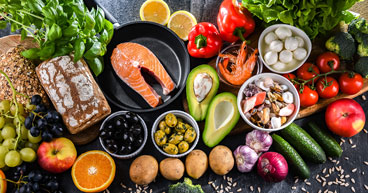
Proper nutrition is key to good health. For cancer patients, eating a balanced and healthy diet may improve outcomes, reduce side effects of cancer treatments and improve quality of life. This may be easier said than done, however, since some of the most common side effects of cancer treatment include diminished appetite, nausea, and other gastrointestinal issues.
As part of their care team, cancer patients have dietitians available to develop a dietary plan for each person’s unique circumstances. Dietitians may recommend foods that may help soothe an upset digestive system while providing necessary nutrients to help patients stay strong during treatment and aid in recovery. They may suggest dietary supplements as well to ensure patients get all the essential nutrients they need.
“Getting adequate nutrition helps with healing and supports our immune system,” says Lora Reeves, MS, RD, LD, Clinical Oncology Dietitian, City of Hope® Cancer Center Atlanta. “Malnutrition may lead to really poor outcomes in treatment, like muscle wasting. We don’t want [patients] to start using their muscle as a source of energy. Making sure they’re strong for treatment, that’s a reason nutrition has be a priority.”
Decreased appetite is a leading symptom dietitians try to mitigate, says Jayla Thurman, RDN, LD, Clinical Oncology Dietitian at City of Hope Atlanta.
“As your nutritional status declines, your doctors are less likely to continue the treatment at the recommended dose or on time because your nutritional status affects a lot more than just your weight,” Thurman says. “Adequate nutrition not only improves your overall quality of life, but it’s also may ensure you get treatment as recommended and at the correct dose.”
Getting proper nutrition is different for everyone depending on cancer diagnosis and treatment plan, the dietitians say. Based on their experience working with cancer patients, they can recommend different strategies based on the patient’s particular needs.
In this article, we will review:
If you’ve been diagnosed with cancer and are interested in a second opinion on your diagnosis and treatment plan, call us or chat online with a member of our team.
What foods are easier to digest?
For a cancer patient with an upset stomach or digestive system issues dietitians may recommend foods that are easier to digest. For patients with diminished appetite, they will likely encourage anything that can be tolerated, even if it’s something not normally recommended.
“People forget calories are energy, and if you’re not getting enough calories, you’re not getting enough energy. It’s like trying to run a car without gas in it,” says Carolyn Lammersfeld, Vice President of Integrative Oncology and Clinical Services at City of Hope® Cancer Centers Atlanta, Chicago and Phoenix.
Dietitians often turn to the American Institute of Cancer Research’s healthy diet guidelines to advise patients, but sometimes whatever is appealing to the patient is fine.
“If somebody is not eating at all and nothing sounds good to them, we encourage them to eat what they can tolerate even if those foods are deemed less healthy. It’s important that we meet patients where they are and that may not always mean a rigid diet of fruits, vegetables, whole grains and lean meats,” says Reeves. “If all they can stomach is a smoothie with frozen yogurt or they want a fried chicken sandwich, our top priority is making sure they’re fed and not breaking down muscle for energy.”
Generally, soft/bland foods are easier to digest if you have an upset stomach. Such options include:
- Warm or cold cereal
- Plain white English muffins, bagels, bread or crackers
- Hardboiled eggs
- Mild cheeses
- Yogurt
- Plain pasta with a bit of butter
- White rice or rice porridge
- Lean meat
- Tofu
- Chicken soup with rice or noodles
- Unsweetened apple sauce or peeled apples
- Creamy nut butters
- Bananas
- Sweet or white potatoes, mashed or without the skin
- Gelatin
- Fruit and vegetable juices without pulp
Canned vegetables may also be easier on the digestive system, just be mindful of added sodium. Rinsing them before eating can lower the sodium content. Cooking is another method of making food more digestible while retaining some of their important nutritional benefits.
Cooking methods also may have an impact. For instance, rather than frying a food, try grilling, broiling, baking, steaming or poaching it to see if makes it easier to tolerate.
Certain types of fiber are better tolerated when experiencing intestinal discomfort or GI symptoms. Soluble fiber, found in foods like oatmeal, applesauce and barley, absorbs water and becomes gelatinous as it is digested. Insoluble fiber, found in foods like many whole grains, and unpeeled fruits and vegetables, has a wide variety of health benefits. However, it may aggravate certain GI symptoms.
What foods may cancer patients need to avoid?
During cancer treatment the immune system may be compromised, making it is important for patients to practice food safety when preparing foods at home, that others have prepared, or when eating out. The following foods are associated with an elevated risk of foodborne illness:
- Lightly cooked or raw fish or shellfish
- Soft-cooked eggs or foods that contain raw eggs, such as homemade mayonnaise
- Unpasteurized cheeses and dairy products
- Unwashed fruits or vegetables
Other ingredients and foods that may aggravate digestive and other symptoms from cancer treatment that may need to be avoided include:
- Foods high in fat, including fast food and highly processed snacks
- Carbonated and caffeinated beverages and alcohol
- Spicy foods
- Tough or fibrous meats including sausages with casings and lunch meats
If a patient craves these foods and they do not upset his or her system, they may provide calories and nutrients during a time when they are essential to successful outcomes. Dietitians work with patients to assure these and other foods are okay based on the type of cancer they have, treatments being given and past medical history.
If you’ve been diagnosed with cancer and are interested in a second opinion on your diagnosis and treatment plan, call us or chat online with a member of our team.



